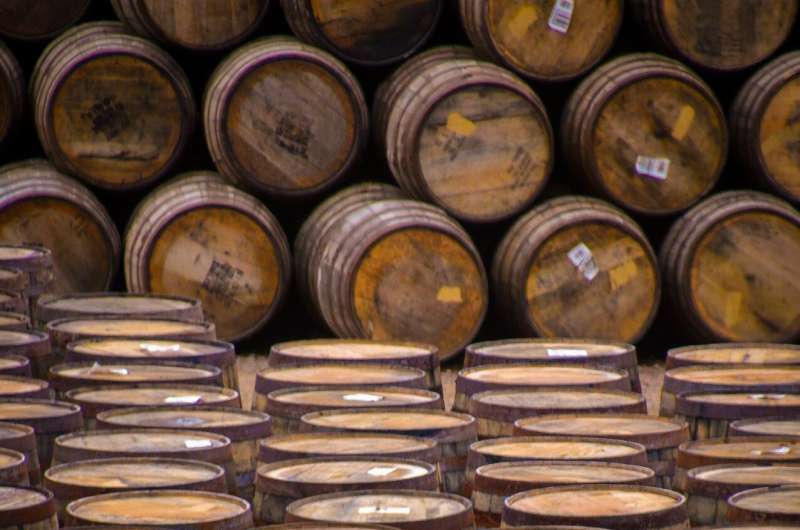This article has been reviewed according to Science X's editorial process and policies. Editors have highlighted the following attributes while ensuring the content's credibility:
fact-checked
trusted source
proofread
Scientists help turn whisky waste into valuable commodity

A new method to extract valuable bio-based chemicals from whisky distillery waste streams could transform manufacturing and be worth up to £90 million in global chemical manufacturing markets.
Scientists from RIPCELL, a chemical manufacturing business, are working with researchers from the University of Aberdeen to demonstrate the feasibility of recovering high-value compounds, such as lactic acid, from pot ale and spent lees—co-products of the first and second stages of the whisky distillation process.
These extracted chemicals have potential applications in sectors including pharmaceuticals, food and drink, and cosmetics, where manufacturing typically depends on unsustainable, petrochemical-derived ingredients.
The project used samples of waste streams provided by whisky group Chivas Brothers from 12 of its distilleries across Scotland.
The research team developed a process using a separation technique known as liquid chromatography to isolate and extract higher-value acids, initially from pot ale. It has now been adapted to retrieve additional solvents from spent lees.
While residue from pot ale is typically used in low value applications such as animal feeds, spent lees are currently discarded. Up to 10 liters of spent lees are generated for every liter of whisky made, and due to variations in distillery processes, water sources, and raw materials, co-products from different distilleries contain different chemical compounds.
A life cycle analysis of the process was also completed to quantify its environmental impact. The results showed that the bio-based chemicals produced through this method have a significantly lower carbon footprint compared to those produced through traditional petrochemical routes. Estimates suggest that on a global scale, the new manufacturing method for target chemicals could reduce industry emissions by 392 million kg of CO2 equivalent per year.
Following the success of the feasibility study, the next phase for the team will involve scaling up the separation process to prove its viability at an industrial scale.
Dr. Eve Wildman, founder of RIPCELL, said, "Around 2.6 billion liters of wastewater is produced from the Scottish whisky industry every year, so the potential of this process is huge. For decades, the majority of these co-products have been used as animal feed, but we have found a new, more valuable option to deal with spent lees that could change the ways in which distilleries manage and process their residues.
"At the same time, this could be transformational for the chemical industry. By taking a sustainable approach to manufacturing key compounds, rather than using fossil fuels, RIPCELL can help to reduce greenhouse gas emissions from the production process. For every kilo of bio-chemicals produced, we can remove 1.59 kg of harmful greenhouse gas emissions."
Dr. Liz Fletcher, director of business engagement at IBioIC, said, "This project is a brilliant example of how we can add economic value by taking a circular approach to co-products and applying biotechnology. For both whisky producers and the chemicals industry, this process marks a significant step forward in reducing the environmental impact of manufacturing. We look forward to supporting RIPCELL throughout its next steps to bring the process closer to commercial application."
Dr. Alan Mccue, senior lecturer at the University of Aberdeen, added, "The idea of utilizing wastewater from a traditional industry like whisky production for the recovery of bio-based chemicals is highly innovative. It's great to see Scottish heritage being linked to sustainable chemical production. The outcomes of this project are really exciting, and I look forward to supporting RIPCELL in the next stages of its development."
Provided by University of Aberdeen





















